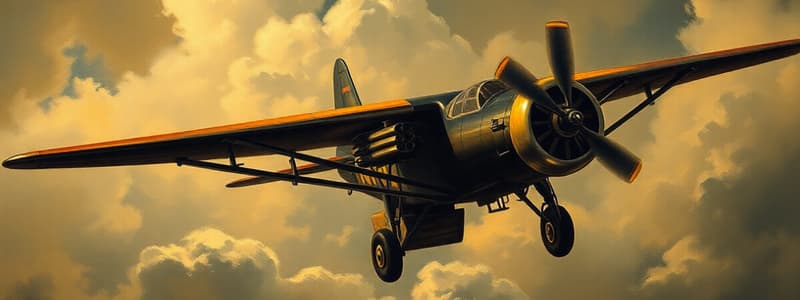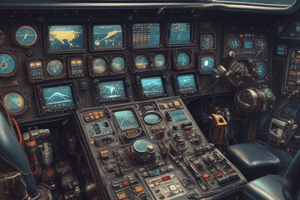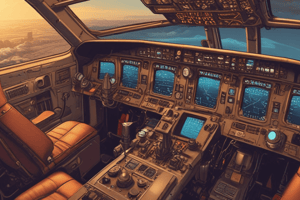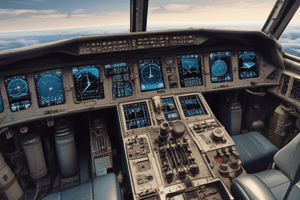Podcast
Questions and Answers
What is the primary function of a torque tube in a basic control system?
What is the primary function of a torque tube in a basic control system?
- To guide control cables through a structure member
- To maintain constant tension on cables
- To connect cockpit controls to control surfaces
- To change linear motion to rotary motion (correct)
What role do cable guards or guard pins play in a flight control system?
What role do cable guards or guard pins play in a flight control system?
- They dampen vibration of the control cables
- They maintain constant tension on the cables
- They prevent cables from jumping out of pulleys (correct)
- They stabilize the control surfaces during flight
In a direct cable control system, what is associated with the control column's operation?
In a direct cable control system, what is associated with the control column's operation?
- Imparting tension to the steel cables (correct)
- Changing the direction of control cables
- Altering the internal structure of the fuselage
- Adjusting the length of the cable
How does a cable tension regulator function in a flight control system?
How does a cable tension regulator function in a flight control system?
Which type of mechanical control system is characterized by the use of bell cranks, levers, and torque tubes?
Which type of mechanical control system is characterized by the use of bell cranks, levers, and torque tubes?
What happens to the force the pilot feels on the control column as airspeed increases in a direct cable control system?
What happens to the force the pilot feels on the control column as airspeed increases in a direct cable control system?
What is the purpose of fairleads in a flight control system?
What is the purpose of fairleads in a flight control system?
Which of the following systems is not recognized as a type of mechanical control system used in aircraft?
Which of the following systems is not recognized as a type of mechanical control system used in aircraft?
What is a primary advantage of cable systems over push-pull rod systems in a flight control system?
What is a primary advantage of cable systems over push-pull rod systems in a flight control system?
In the hydraulic power flight control system, what role does the servo valve play?
In the hydraulic power flight control system, what role does the servo valve play?
Which of the following statements about the behavior of cables and push-pull rods in cold weather is true?
Which of the following statements about the behavior of cables and push-pull rods in cold weather is true?
Which component is NOT part of the hydraulic circuit in a hydraulic flight control system?
Which component is NOT part of the hydraulic circuit in a hydraulic flight control system?
What is a significant disadvantage of the push-pull rod system compared to the cable system?
What is a significant disadvantage of the push-pull rod system compared to the cable system?
What mechanism assists the pilot in controlling larger and heavier aircraft?
What mechanism assists the pilot in controlling larger and heavier aircraft?
Why are cables considered a safer transmission system than push-pull rods?
Why are cables considered a safer transmission system than push-pull rods?
Which of the following is true regarding the mechanical circuit in the hydraulic flight control system?
Which of the following is true regarding the mechanical circuit in the hydraulic flight control system?
What happens to the input from the flight deck during a hydraulic power failure in a power-assisted flight control system?
What happens to the input from the flight deck during a hydraulic power failure in a power-assisted flight control system?
In a power-operated type hydraulic system, what is directly connected to the flight control surface?
In a power-operated type hydraulic system, what is directly connected to the flight control surface?
What role does the artificial feel unit play in a hydraulic transmission system?
What role does the artificial feel unit play in a hydraulic transmission system?
Which type of feel dominates at low speeds and high deflection control demands?
Which type of feel dominates at low speeds and high deflection control demands?
How does the input force from the control column affect elevator movement in the power-assisted type system?
How does the input force from the control column affect elevator movement in the power-assisted type system?
In a power-operated flight control system, what must the pilot do to control the aircraft?
In a power-operated flight control system, what must the pilot do to control the aircraft?
Which characteristic is present in the power-operated type hydraulic system concerning pilot feedback?
Which characteristic is present in the power-operated type hydraulic system concerning pilot feedback?
Which scenario describes when the Q feel is expected to dominate in an aircraft control system?
Which scenario describes when the Q feel is expected to dominate in an aircraft control system?
What is one main advantage of fly-by-wire systems over traditional mechanical control methods?
What is one main advantage of fly-by-wire systems over traditional mechanical control methods?
What factor is most concerning regarding the reliability of fly-by-wire systems?
What factor is most concerning regarding the reliability of fly-by-wire systems?
In fly-by-wire systems, what role do electrohydraulic valves play?
In fly-by-wire systems, what role do electrohydraulic valves play?
Which component primarily directs hydraulic fluid to control actuators in a fly-by-wire system?
Which component primarily directs hydraulic fluid to control actuators in a fly-by-wire system?
What does the elimination of traditional connecting methods in fly-by-wire systems result in?
What does the elimination of traditional connecting methods in fly-by-wire systems result in?
What is the primary purpose of hydraulic actuators in large aircraft control systems?
What is the primary purpose of hydraulic actuators in large aircraft control systems?
What material are aircraft control cables generally fabricated from?
What material are aircraft control cables generally fabricated from?
What is the function of a pulley in an aircraft control system?
What is the function of a pulley in an aircraft control system?
Which component is primarily used for adjusting the tension of control cables?
Which component is primarily used for adjusting the tension of control cables?
How is a bell crank utilized in an aircraft control system?
How is a bell crank utilized in an aircraft control system?
What is the correct description of a push pull rod in an aircraft control system?
What is the correct description of a push pull rod in an aircraft control system?
What is the function of a quadrant in a flight control system?
What is the function of a quadrant in a flight control system?
What determines the types and complexity of control mechanisms in an aircraft?
What determines the types and complexity of control mechanisms in an aircraft?
Flashcards
What are aircraft control cables made of?
What are aircraft control cables made of?
They are generally fabricated from carbon fibre or corrosion resistant steel wire used fro aircraft control. All steel cables used in aircraft mechanical transmission are constructed with 7 strands which are helically twisted and each strand consists of a number of wires. The size of the cables is based on the circumscribed circle, the number of strand and number of wires per strand.
What is the function of pulleys in aircraft control systems?
What is the function of pulleys in aircraft control systems?
They are used to change the direction of a cable in an aircraft's control system.
What are turnbuckles used for in aircraft control systems?
What are turnbuckles used for in aircraft control systems?
They are commonly used for adjusting the tension of the control cables.
What is the purpose of a bell crank in an aircraft control system?
What is the purpose of a bell crank in an aircraft control system?
Signup and view all the flashcards
What does a push pull rod do in an aircraft control system?
What does a push pull rod do in an aircraft control system?
Signup and view all the flashcards
What is the function of a quadrant in aircraft control systems?
What is the function of a quadrant in aircraft control systems?
Signup and view all the flashcards
Why are hydraulic actuators used in flight control systems of large or high performance aircraft?
Why are hydraulic actuators used in flight control systems of large or high performance aircraft?
Signup and view all the flashcards
How do the control mechanisms used in an aircraft vary?
How do the control mechanisms used in an aircraft vary?
Signup and view all the flashcards
Torque tube
Torque tube
Signup and view all the flashcards
Cable guards or guard pins
Cable guards or guard pins
Signup and view all the flashcards
Fairlead
Fairlead
Signup and view all the flashcards
Cable tension regulator
Cable tension regulator
Signup and view all the flashcards
Direct cable control system
Direct cable control system
Signup and view all the flashcards
Push-pull rod control system
Push-pull rod control system
Signup and view all the flashcards
Cable and pulley systems
Cable and pulley systems
Signup and view all the flashcards
Chain and sprocket system
Chain and sprocket system
Signup and view all the flashcards
Weight advantage of cables
Weight advantage of cables
Signup and view all the flashcards
Force transmission in cable and push-pull systems
Force transmission in cable and push-pull systems
Signup and view all the flashcards
Precision of cable vs. push-pull systems
Precision of cable vs. push-pull systems
Signup and view all the flashcards
Safety of cable vs. push-pull systems
Safety of cable vs. push-pull systems
Signup and view all the flashcards
Purpose of hydraulic actuators in flight control
Purpose of hydraulic actuators in flight control
Signup and view all the flashcards
Mechanical circuit in hydraulic flight control
Mechanical circuit in hydraulic flight control
Signup and view all the flashcards
Hydraulic circuit in flight control
Hydraulic circuit in flight control
Signup and view all the flashcards
Function of servo valves in flight control
Function of servo valves in flight control
Signup and view all the flashcards
What is Fly-by-Wire (FBW)?
What is Fly-by-Wire (FBW)?
Signup and view all the flashcards
What are the advantages of Fly-by-Wire?
What are the advantages of Fly-by-Wire?
Signup and view all the flashcards
What are the potential drawbacks of Fly-by-Wire?
What are the potential drawbacks of Fly-by-Wire?
Signup and view all the flashcards
How does the FBW system translate pilot input?
How does the FBW system translate pilot input?
Signup and view all the flashcards
Why are backup systems important in FBW?
Why are backup systems important in FBW?
Signup and view all the flashcards
Hydraulic System Failure in Power-Assisted Flight Control
Hydraulic System Failure in Power-Assisted Flight Control
Signup and view all the flashcards
Control Lever in Power-Assisted Systems
Control Lever in Power-Assisted Systems
Signup and view all the flashcards
Pilot Effort in Power-Operated Flight Control
Pilot Effort in Power-Operated Flight Control
Signup and view all the flashcards
Artificial Feel Unit in Power-Operated Systems
Artificial Feel Unit in Power-Operated Systems
Signup and view all the flashcards
Types of Artificial Feel Units
Types of Artificial Feel Units
Signup and view all the flashcards
Spring Feel
Spring Feel
Signup and view all the flashcards
Q Feel
Q Feel
Signup and view all the flashcards
Fly-by-Wire (FBW) Systems
Fly-by-Wire (FBW) Systems
Signup and view all the flashcards
Study Notes
Aircraft Hydraulic Systems
- Aircraft size, speed and mission dictate the complexity of control mechanisms
- Small or low-speed aircraft have cockpit controls directly connected to control surfaces via cables or pushrods
- High-performance aircraft use hydraulic actuators to move control surfaces relieving pilot fatigue
- This reduces pilot fatigue and improves system performance
Hydraulic Power - Flight Control System Components
Cables
- Made from carbon fiber or corrosion-resistant steel wire
- Aircraft mechanical cables use 7 strands, each with multiple wires, helically twisted
- Cable size is determined based on the circumscribed circle, number of strands, and wires per strand
Pulleys
- Used in aircraft control to change the direction of a cable
Turnbuckles
- Commonly used to adjust the tension on control cables
- Length (threads flush with ends of barrel)
- Swaged terminal
- Barrel
- Pin eye
- Turnbuckle body
- Locking clip
Bell Cranks
- Used to transmit and change the direction of force
- It transmits and permits change in the direction of the force.
Push Pull Rods
- Used to transmit force and motion between components
- It is used between bell crank to torque arm to transmit the force and motion from one member to the other.
- Push pull rods are also called control rods.
- Checknut
- Threaded rod end
- Tube
- Adjustable antifriction rod end
- Rivets
- Adjustable rod end clevis
Quadrant
- Used at the base of control columns or sticks to impart force and motion to a cable system
- Imparts force and motion to a cable system
Torque Tube
- A hollow shaft that converts linear motion to rotary motion
- A torque arm or horn is attached to the tube, either by welding or bolting, imparting twisting motion
Cable Guards / Guard Pins
- Installed on pulley brackets to prevent cables from jumping out of pulleys
- Prevents cables from jumping out
Fairlead
- Guide control cables through structure members
- Dampen cable vibration, maintain alignment and seal openings (e.g., bulkheads)
Cable Tension Regulator
- Ensures constant cable tension at various temperatures
- Tension is checked using a tensionmeter
Types of Mechanical Control Systems
- Push-pull rod system
- Cable and pulley systems
- Chain and sprocket system
Direct Cable Control System
- High-strength steel cable connects cockpit controls directly to control surfaces
- Pulleys support the cable through the fuselage
- Directs the cable; used in low-speed aircraft
- Pilot force on the control column matches the airspeed
Push Pull Rod Control System
- Uses bell cranks, levers, and torque tubes
- Cockpit controls connect to a hollow aluminum tube with threaded inserts and a clevis or rod bearing
Cable & Pulley vs Push-pull Rod Systems
- Cables are lighter than push-pull rods
- Cables only transmit pull forces, while push-pull rods transmit both push and pull
- Cable systems have less connections for less mechanical play and more accurate transmission
- Cables show warning signs before breaking, while push-pull rods break suddenly. Cables are safer
- Cable tension decreases with cold weather, while push-pull rod material is similar to aircraft structure
- The pilot may feel air load effects differently in different types of systems
Hydraulic Power Flight Control System
- As aircraft increase in size, control becomes more difficult
- Power-boost control systems operate similarly to power steering in automobiles (hydraulic actuator in parallel) and directs hydraulic fluid to actuate the surface
- Mechanical circuit connects cockpit controls to hydraulic systems
- Hydraulic circuits use pumps, reservoirs, filters, pipes, valves, and actuators
- Actuators convert hydraulic pressure into control surface movement.
Hydraulic Power Flight Control System - Continued
- Servo valves control actuator movement
- The pilot's input is transmitted to the servo control unit through the mechanical linkages
- Servo control moves and controls the surface in proportion to input signal
- The Servo valve amplifies mechanical input by directing high-pressure hydraulic fluid
- Different modes of operation (power-assisted, power-operated).
- Power-assisted type: steering column and control surface are disconnected - Hydraulic actuators bypass and force goes to the control surface if power fails
- Power-operated type: the pilot's control connects only to the control lever, servo connects to control surface
Artificial Feel Unit
- In a hydraulic transmission system, the pilot does not directly feel the effects of air load
- Artificial feel unit simulates air load
- Two types: spring feel (low speed, high deflection), Q-feel (high speed, low deflection)
Electrical and Fly-By-Wire Systems
- Modern aircraft use electric wires to connect flight controls instead of physical components
- Pilot inputs are converted into electric signals
- A computer processes flight characteristics
- Processed signals convert to hydraulic signals to move control surfaces
- Advantages: reduced weight and maintenance time
Fly-By-Wire Systems Concerns
- Reliability is a major concern; computer failure results in immediate loss of control
- Systems often include backup system
Studying That Suits You
Use AI to generate personalized quizzes and flashcards to suit your learning preferences.
Related Documents
Description
Test your knowledge on the various components and functions of flight control systems. This quiz covers topics such as torque tubes, cable guards, and hydraulic power systems. Perfect for aviation enthusiasts and students studying aircraft mechanics!




